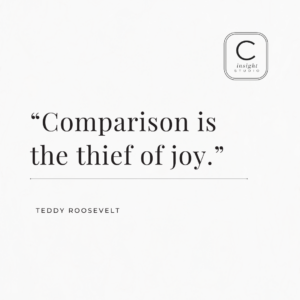What is Impostor Syndrome? How does it affect us and what can we do to reach beyond it? Career coach and author Julie Chase shares her own story with Impostor Syndrome, and what you can do to beat it too.

Several years ago, I launched a blog. Much to my frustration, I immediately began having trouble writing articles.
Not because of writer’s block or a lack of topics and information to share, but due to an attack of imposter syndrome. Despite having worked with 100+ coaching clients around career success, I kept thinking “Who am I to talk about hiring trends and job search strategies? Am I really an expert?” I asked myself what it would take for me to feel qualified – a certain number of clients or years…I wasn’t sure.
I thought about the clients I worked with. I often heard them talk about their own imposter syndrome, even when they clearly had domain expertise or extensive leadership experience.
I was especially surprised when seemingly confident executives shared their experience around imposter syndrome. There were times when they didn’t feel capable or worthy to speak at an event or lead a new initiative. They were not immune to it either – just more skilled at disguising their own feelings and beliefs around self-doubt.
Just like most challenges I face, I dug into research on the topic. It helped me understand that many people, including high achievers, experience imposter syndrome and ways to overcome it. I gained enough confidence to write this article with the intention of helping others quiet their limiting inner voice.
Signs of Imposter Syndrome
Here’s my hypothesis on imposter syndrome. I believe everyone has experienced some form of it, especially when they start something new like a job, a class or even a hobby. We worry if we can actually do it and do it well.
Here are some pretty common signs of imposter syndrome. You…
- Believe you’re the only one who has insecure feelings.
- Fixate on even the smallest mistakes.
- Discount your work by attributing great results to luck or the team.
- Compare yourself to others who have achieved more.
- Feel proud of your work, but it’s short-lived because you feel like you could have done better.
- Downplay your work, achievements and strengths: you feel uncomfortable when someone compliments you. You might throw a compliment back, laugh or change the subject.
We have a knack for making ourselves feel like we’re the only ones in the world who are suffering, which is incredibly isolating. When in fact, these are experiences that every human has felt. Oftentimes we suffer silently, which leads to an unhealthy state of mind.
Imposter syndrome can hold us back from personal and professional growth. It can also cause anxiety and depression.
So how can we stop these feelings of unworthiness and self-doubt?
Ways to Overcome Imposter Syndrome
 The first step is to stop comparing ourselves to others. I love this quote from Teddy Roosevelt: “Comparison is the thief of joy.”
The first step is to stop comparing ourselves to others. I love this quote from Teddy Roosevelt: “Comparison is the thief of joy.”
The truth is we can always find someone who’s done something better than us. When we compare ourselves to others, we’re letting the ego drive our thoughts and feelings. When we let go of that comparison, we open up space to appreciate and take care of ourselves.
Next, focus on creating more awareness when you judge yourself. Would you ever say those things to someone you care about? Why do you say them to yourself?
When you find yourself in a negative thought pattern, become aware of it. Ask yourself if it’s true.
For example, when I worked as an event manager, if I had a bad day, I might say something like “I’m terrible at managing events.” I can’t keep track of everything and nothing gets done.”
That is literally not true. When I managed events, everything that was important got done. More importantly, the events were effective – they exceeded pipeline and revenue goals. So it’s helpful to recognize the pattern and then tell yourself that the thoughts are not true and they definitely don’t define you.
The next step is to turn it around by focusing on something positive about yourself. Like how a lot of people complimented me on how the booth looked or how the keynote speech went. You can also focus on what you’re grateful for — big and small. It might be for your job, working with great people, having an amazing support system, or even that the iPad worked at the conference.
Lastly, you should share your feelings with a confidant. This is a good way to see if there’s a gap between your thoughts and reality. This can also help release negative emotions, which is often a great relief. And you’ll also get the positive feedback, support and love you deserve.
Now Exercise that New Muscle!
Once you have “trained” your brain to think differently, try some of these exercises to keep up your progress.
- Write a list of all your accomplishments and failures. This is insightful as it highlights how you’ve overcome obstacles, gained key takeaways and pivoted to a healthier mental outlook. Think about how many steps it took to accomplish something big. Or how you overcame failure and built resiliency. This helps develop confidence that you can do it again (of course you can)!
- Journal your feelings the next time you’re feeling stuck. Start with a prompt like “What’s top of mind for me?” or “How am I feeling about X?” Take a break, read it from the perspective of a close friend sharing their thoughts. Then write or think about how you’d respond to them. This is an opportunity to practice kindness and self-compassion.
- Write out your worst-case scenario. Fear is the most powerful and paralyzing obstacle we face. If you write out the worst, it can actually help you let go of it and move forward.
I did this exercise the first year I started this business. I was afraid of the unknown and my inexperience as an entrepreneur. My business coach told me to write out the worst case scenario.
For me that included my business going bust and rejoining the corporate world. It didn’t feel like the best thing ever, but it felt like something I could bounce back from, eased my fears and gave me more room to grow my business.
If you’re interested in learning more, here are some of the resources that gave me greater insight into imposter syndrome.
What is Imposter Syndrome and How Can You Combat It? Ted-Ed
What is Imposter Syndrome? Arlin Cuncic, Verywell Mind
The Surprising Solution to the Imposter Syndrome, Lou Solomon, TEDx
The Gifts of Imperfection, Brené Brown
Reese Witherspoon on Turning Impostor Syndrome Into Confidence, ReThinking with Adam Grant
I hope you feel empowered to start that one thing you’ve been wanting to do, but have been holding back!


